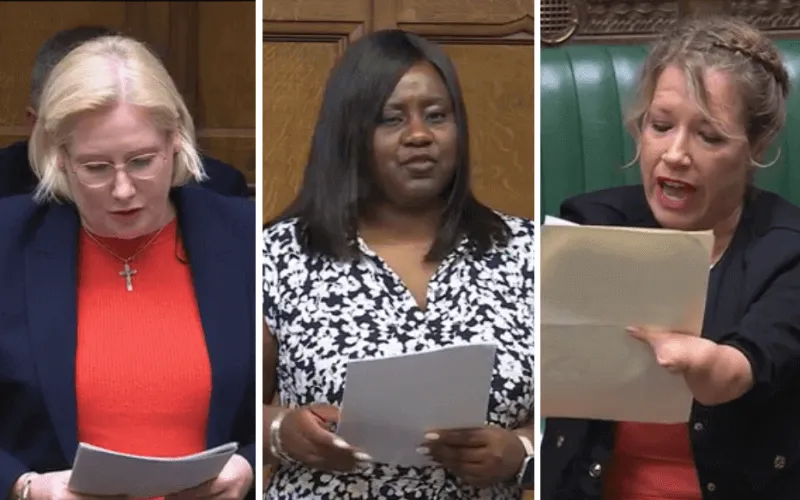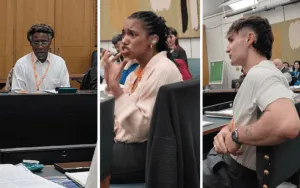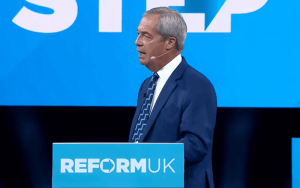Four disabled Labour MPs stood up to their government’s attempts to reduce vital disability benefits, despite ministers’ chaotic last-ditch concessions to rebels that removed a significant chunk of their cuts bill.
Marsha de Cordova, Marie Tidball and Emma Lewell all voted against the universal credit and personal independence payment bill, and each of them delivered powerful speeches in the House of Commons on Tuesday.
Another disabled Labour MP, Marie Rimmer, also voted against the bill.
But a fifth disabled Labour MP, Vicky Foxcroft – who had played a key role in the rebellion that forced a series of government concessions – voted for the bill and its significant cuts to the health element for many new claimants of universal credit.
She and many other Labour MPs who had previously opposed the cuts bill voted with the government after the minister for social security and disability, Sir Stephen Timms, suddenly announced at 5.25pm on Tuesday – nearly four hours after the debate began and just 95 minutes before MPs voted – that there was to be another concession.
Ministers had already announced that existing PIP claimants would not now be subjected to new rules that meant they would have to be awarded at least four points on at least one “activity” to qualify for the PIP daily living component, which were to be introduced from November 2026.
Work and pensions secretary Liz Kendall had also announced the previous day that the government would no longer freeze the health element top-up for existing claimants of universal credit, and that they and new claimants who were terminally-ill or were placed in the “severe conditions group” would instead see the combined value of their universal credit standard allowance and health top-up “rise at least in line with inflation”.
But in a dramatic intervention, Timms then also announced at 5.25pm that no cuts at all to PIP would go ahead until his own review into PIP – which Kendall said would be “co-produced with disabled people, their organisations, clinicians, other experts and MPs” – was completed in the autumn of 2026.
This final concession ensured that the bill passed by 335 to 260 votes.
The committee stage of the bill will take place in just a few days, on Wednesday (9 July), but without any measures to cut PIP.
Marsha de Cordova, a former shadow minister for disabled people, was one of the few MPs in the debate to warn how previous Department for Work and Pensions (DWP) cuts and reforms had led previously to the deaths of many disabled people.
Speaking before the final concessions were announced, she pointed to the many internal process reviews into deaths linked to DWP actions, and the long-delayed second inquest into the death of Jodey Whiting, which found last month that DWP’s decision to wrongly stop her benefits after a string of safeguarding failings was the “trigger” for her to take her own life.
De Cordova told fellow MPs: “I set that out because it is important that we understand that disabled people’s lives have not been valued or respected for the last 14 years.”
She also pointed to the findings of the UN committee on the rights of persons with disabilities, which last April found successive Conservative-led governments had made “no significant progress” in the more than seven years since a finding of “grave and systematic” violations of the UN disability convention.
Marie Tidball delivered an emotional speech, in which at times she appeared close to tears, in which she told MPs she would be voting against the bill “with a heavy, broken heart”.
She said she had been in discussions with ministers since April, “making clear that I could not support the proposals on PIP”.
She added: “PIP is an in-work benefit designed to ensure that disabled people can live independently.
“Low-level support such as PIP helps to build the bridge to the deinstitutionalisation of disabled people, keeping us out of the dark corners of hospitals, prisons and social care settings.”
Tidball voted against the bill despite the late concession from Sir Stephen Timms that ruled out all PIP cuts until the end of his review.
Emma Lewell also voted against the bill, despite the late concession.
She had told MPs that past Conservative social security reforms had not led to any cost savings but instead to “an increase in poverty, an increase in suicides, strain on the NHS and other public services, and, in the long run, higher welfare spending and reduced growth”.
But two other disabled Labour MPs, Liam Conlon and Jen Craft, voted for the bill, although they did not speak during the debate.
Steve Darling, the disabled Liberal Democrat MP and his party’s work and pensions spokesperson, voted against the bill, as did the rest of his party.
He had told MPs: “We all know that rushed bills are poor bills, and the law of unintended consequences will come to haunt the government if this bill goes through.”
Rachael Maskell, who was among leaders of the rebel Labour MPs – and proposed an amendment that would have killed the bill, but was defeated by 328 to 149 votes – told MPs in another passionate speech that she was voting against the bill because it was “a matter of deep conscience, as it should be and will be for us all”.
She was another MP who highlighted the harm caused by previous cuts and reforms to disability benefits, pointing to the 600 suicides between 2010 and 2013 that were linked to the programme to reassess incapacity benefit claimants.
Maskell said: “When they are managing discomfort, despair, pain and prejudice, are isolated and lonely, or their life has spiralled out of control, disabled people want anything but this bill.
“They are already discriminated and dehumanised, so I plead that we do not leave them desperate, too.”
There was disappointment among many disabled people that among those voting for the cuts to the universal credit health element was Labour’s Debbie Abrahams, chair of the work and pensions committee, who had been outspoken about her concerns about the “dog’s breakfast of a bill”.
She had told MPs that “too many people relying on social security support to survive have died through suicide, starvation and other circumstances exacerbated by their poverty” in the last 15 years as a result of the “punitive, even dehumanising, social security system in which not being able to work has been viewed with suspicion or worse, with devastating consequences”.
But she still voted for the bill, despite its significant cuts to the rate of universal credit that will be paid to most new recipients of the health element of universal credit from next April, who will see the health element nearly halved and then frozen.
Asked last night (Wednesday) why she had voted for the bill, despite the significant cuts to disabled people’s support that it still contains, Vicky Foxcroft referred Disability News Service to a statement on her website.
She did not mention those cuts in the statement, but she said that securing the concessions was “a huge victory for Labour backbenchers” and that she voted for the bill because it was “now in a much better form than it was two weeks ago”.
She said she would only vote for the bill at its final Commons stage “if the final proposals reflect the commitments ministers have made”, and that she would be “looking for ministers to take these commitments forward and ensure we have co-production right across government”.
Because of the number of changes to the original bill, DNS asked DWP to confirm exactly what the bill would now do.
Here is the list provided by the department (edited for clarity by DNS):
- The bill will make changes to universal credit (UC) from April 2026
- It will not bring forward any changes to the PIP eligibility criteria
From April 2026:
- The standard allowance of UC will rise above inflation in each of the next four years
- The health element of UC for new claimants will be reduced to £50 per week.
- Existing claimants of the health element and those new health element claimants meeting the severe conditions criteria (SCC) or considered under the special rules for end of life (SREL) will see their UC standard allowance combined with the UC health element rise in line with inflation in the next four years
- People in the SCC group will be exempt from future UC reassessments
Picture: Emma Lewell (left), Marsha de Cordova, and Marie Tidball (right)

 ‘DWP were pushing, pushing, pushing my wife to kill herself, but nothing has been done’
‘DWP were pushing, pushing, pushing my wife to kill herself, but nothing has been done’ Praise for ‘incredible’ new plan to replace ‘deeply-flawed’ PIP
Praise for ‘incredible’ new plan to replace ‘deeply-flawed’ PIP Farage finally confirms: A Reform UK government would slash spending on disability benefits
Farage finally confirms: A Reform UK government would slash spending on disability benefits